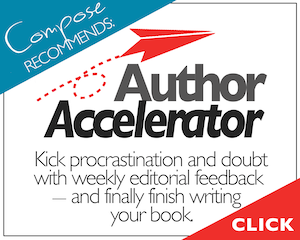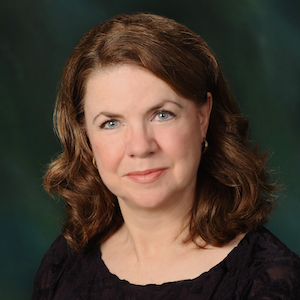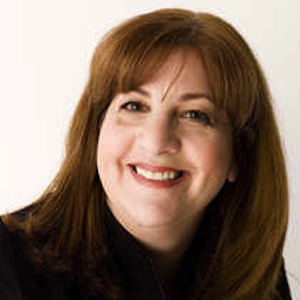Get a Free Week of Jennie Nash’s Book-Coaching Program
One of our Fall 2014 features is about What Good Editors Do and How to Find One. But before you need an editor, you need to finish (uh . . . or maybe start) that book you’ve been working on or dreaming about.
You’re in luck: Jennie Nash—the features editor for our first four issues—is inviting readers of Compose to try her Author Accelerator book-coaching program for free. Because we’ve worked closely with Jennie for a couple of years now, we are delighted to act as an affiliate.
Keep reading for some insight into what might be preventing you from finishing your book, and for more info on how you can get a free week’s trial of her Author Accelerator program.
A Lesson on Procrastination and Doubt
by Jennie Nash
In my work as a book coach, I’ve found there are two major roadblocks to writers getting their work done. They are both simple to understand—and very hard to overcome:
- Procrastination
- Doubt
Let’s talk about procrastination first.
When you have a job, and a family, and a dog, and a life, and when your car needs washing, and your tooth needs filling, and the ants are taking over your kitchen (at least, that’s my house right now), it’s easy to put off writing. It’s easy, in other words, to think of writing as a bonus—something that you only get to do when your work is done and the planets are properly aligned.
Except that there’s one teeny, tiny, little problem: The desire to write is always there, even when the planets aren’t aligned, simmering away like a pot of soup on the back burner. It doesn’t go away. That desire looks something like this:
- You can’t get the characters of your novel out of your head. They feel more real to you in many ways than the people in your own life. They speak to you, taunt you. You can’t wait to spend more time with them. When you DO spend time with them, the minutes speed by. You feel relaxed, whole, happy. You wish you could write every day but, well, there’s the dentist appointment and that meeting at your child’s school.
- Something unusual, or unique, or wild, or compelling happened to you and everyone you share it with says, “You should write a book!” You to begin to think, YES, yes I should write a book. I would love to write a book. So you start writing—awesome scenes, snappy dialogue, heartfelt insights. You feel powerful. You feel that you have something to say that can help other people who are living through what you lived through. You start to feel that this is your purpose in life—to share your story with a wider audience. You wish you could devote enough time to getting the story down, but there’s lunch to make and the dishes to do, so you put off writing until it becomes something you hope to do some day.
- You are on top of the world in your career—an expert, an authority. You dream of capturing everything you know and shaping it into a book so that you can widen your influence, become a speaker or a thought leader—someone quoted by the media, invited to panels. You write pages of notes, worksheets, amazing stories to illustrate your points. You think, I GOT this! But then your best employee quits, your top client needs something tomorrow, there’s a crisis in HR—and suddenly your writing is at the bottom of your to-do list again. You begin to think that what you really need in order to get your writing done is three months free and clear of everything—no family, no Internet, no work—but that time never comes.
Sound familiar?
I can tell you from experience that the only way to get a book to stop haunting you is to write it.
And there are a plethora of touted strategies out there that might help you kick that procrastination:
- Just do it.
- Beat yourself up when you don’t do it, as a means of possibly inspiring yourself to just do it tomorrow.
- Get so jealous of the people who ARE just doing it that you start doing it—at least for a little while—in a fit of rage.
- Get a book deal and have the editor at your publishing house hold you accountable and promise to cut you a check when you finish.
- Set a series of specific and measurable goals and find a way to hold yourself accountable for meeting them.
If this were a test asking you to pick the best answer, you would of course go with No. 5. But, as I said before, that may be easier said than done. Particularly when your procrastination comes with a healthy dose of doubt.
Doubt stops writers the way Superman stops freight trains. It’s shocking that doubt is so powerful, so swift, so strong. It leaps out in front of your best intentions and stops you cold. It never lets up. It’s always there. Here’s how it often looks:
- You never start writing because you’re convinced your idea is crap.
- You never start writing because you think that your idea is awesome but you are convinced that you are untalented, unworthy, and unable to pull it off.
- You start writing but don’t continue because you saw another book that was kind of similar to yours and you realized that you should have done this a year ago and now it’s too late.
- You start writing and you gain some momentum and you give your pages to someone who loves you but who knows nothing about writing. They say something supremely unhelpful that tweaks a raw nerve and you realize you were silly to think you could write a book, so you stop.
- You finish a rough draft of your book but then become terrified of actually moving forward, so instead of looking for an editor and researching agents, you sign up for a writing conference and call that progress instead.
- You send out your book to agents and get some requests for full manuscript reads but suddenly you realize you should have ditched Chapter 3 and revised Chapter 10, so you start tweaking and never respond to the agent, convincing yourself they would have thought it was crap anyway.
There’s no way to get rid of your doubt for good. Doubt happens to everyone who has ever tried to create something, and it happens often. There are only a few ways to manage it:
- Change your self-talk so the voice inside your head is constantly saying, “You can do it! You’re awesome! Keep up the good work!”
- Look for piecemeal outside assurance (from writing courses, writing workshops, writing conferences) every time you feel doubt rear its ugly head.
- Tell yourself you’re not really full of doubt, you’re just too busy and you’ll write your book someday when you have time. (Then, see strategies for overcoming procrastination.)
- Get specific, consistent feedback that lets you know you’re on the right path and helps to keep doubt at bay.
Do you notice the similarities in the best answers to combatting procrastination and doubt (No. 5 and 4, respectively)? They include setting specific, tangible goals and then consistently holding yourself accountable to them—or finding someone else to hold you accountable. This can be a writing buddy, a writing group, a book coach, or an online accountability program that helps you track your progress, such as Storyist, Write or Die or The Writing Circle. My own online accountability program, the Author Accelerator, gives you weekly video lessons, weekly pages deadlines, and feedback from a pro (see special offer, below).
Ultimately, you have to find what works for you to combat procrastination and doubt, but it’s worth the search, because getting to “the end” of your book is an awesome feeling. There are many great days in the life of a book, but finally finishing? That’s a moment that delivers the deepest satisfaction.
Kick Procrastination and Doubt
I’ve developed an online program that gives writers some of the benefits of working with a book coach, without the hefty price tag. It’s called The Author Accelerator, and it was designed specifically to combat procrastination and doubt. You get weekly video lessons, daily emails that count down to your submission day, a submission deadline where you can submit up to ten pages of your book, and personalized, professional feedback from an editor I have trained. Readers of Compose are invited to try the program free for a week—which includes one free submission day. Click on the ad to learn about the Author Accelerator and sign up for your free trial.








